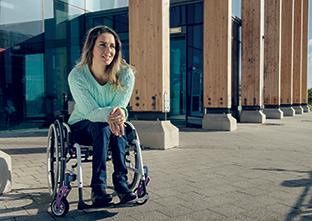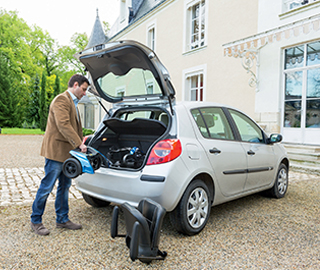On the road again

Invacare is not well known to the greater public. However, it is a leader in the market of home care for the elderly and disabled people. What is its history ?
Invacare is, first and foremost, an American group created at the end of the 19th century in Cleveland, Ohio. As is often the case, it started out as an SME. At the time, it was a small company specialising in the design and manufacture of wheelchairs for disabled people. Invacare's business was booming in the 1970s when it entered the fold of the giant Johnson and Johnson. Their story together only lasted around a decade and Invacare was once again flying solo in 1978. The group continued to grow, namely in Europe, by purchasing several local companies that were leaders in their national markets, such as Poirier, the wheelchair specialist, in France.

What are your "star" products ?
 Our catalogue is very large. Between Europe and the United States, we have around a dozen production sites, each specialising in a specific type of product. We manufacture medical devices, such as scooters for people with reduced mobility, and motorised wheelchairs for those with more severe disabilities. We also develop products linked to home care, such as toilet seat raisers and oxygen concentrators. In every case, we seek to restore independence and autonomy to the daily lives of our customers.
Our catalogue is very large. Between Europe and the United States, we have around a dozen production sites, each specialising in a specific type of product. We manufacture medical devices, such as scooters for people with reduced mobility, and motorised wheelchairs for those with more severe disabilities. We also develop products linked to home care, such as toilet seat raisers and oxygen concentrators. In every case, we seek to restore independence and autonomy to the daily lives of our customers.
Your scooters are quite common in the United States. Is there a market for them in Europe ?
 Yes, and the market is growing by around 5% per year. The scooters are mainly intended for elderly people who have trouble getting around, or for obese people for the same reason. They are less expensive than traditional electric wheelchairs and are less associated with the concept of "disability". I believe that they would be even more successful if medical insurance funds reimbursed users for their purchase. Unfortunately, this is not yet the case in most European countries while electric wheelchairs are often reimbursed, although at a higher cost.
Yes, and the market is growing by around 5% per year. The scooters are mainly intended for elderly people who have trouble getting around, or for obese people for the same reason. They are less expensive than traditional electric wheelchairs and are less associated with the concept of "disability". I believe that they would be even more successful if medical insurance funds reimbursed users for their purchase. Unfortunately, this is not yet the case in most European countries while electric wheelchairs are often reimbursed, although at a higher cost.
These scooters contain many plastics. Why is that ?
Because there are only advantages to using them! It is true that they contain many plastics, as 90% of the visible parts are made from plastics. We mainly use ABS for its rigidity, its strength and its appearance. I can safely say that it would have been impossible to create such original and innovating designs without polymers. Some body parts are even available in various colours and can be switched very easily. It's a fun option for those who want to change their scooter's look to suit their moods. Polymers are now as strong as metals. They can withstand impacts, will not deform and, being coloured throughout, they are quite insensitive to small scratches. In the same vein, the seat is covered in vinyl, a material that is easy to clean that also has a very pleasing flexibility.

Polymers help to reduce weight by a considerable amount. Is this important for scooters ?
 Yes, especially on micro-scooters. The latter are designed to be disassembled in a couple of seconds and be stored in a car's boot. Disassembly is disconcertingly easy as it can be done without resorting to tools. All the individual parts are held together by a system of plastic clips that we have patented. It is simple, solid and very reliable. However, there was still the need to lift the various parts to place them in the boot of the car. This would have been difficult for our customers had our scooters been made from metal. Our first aim is to enable the elderly to recover a certain degree of autonomy and, with this scooter, our mission is a success!
Yes, especially on micro-scooters. The latter are designed to be disassembled in a couple of seconds and be stored in a car's boot. Disassembly is disconcertingly easy as it can be done without resorting to tools. All the individual parts are held together by a system of plastic clips that we have patented. It is simple, solid and very reliable. However, there was still the need to lift the various parts to place them in the boot of the car. This would have been difficult for our customers had our scooters been made from metal. Our first aim is to enable the elderly to recover a certain degree of autonomy and, with this scooter, our mission is a success!
MORE INFORMATION
www.youtube.com/watch?v=-PnpUeaH6q4
www.youtube.com/watch?v=gOlV0V9O_-g
www.invacare.eu.com/products/powered-mobility/scooters/scooters





